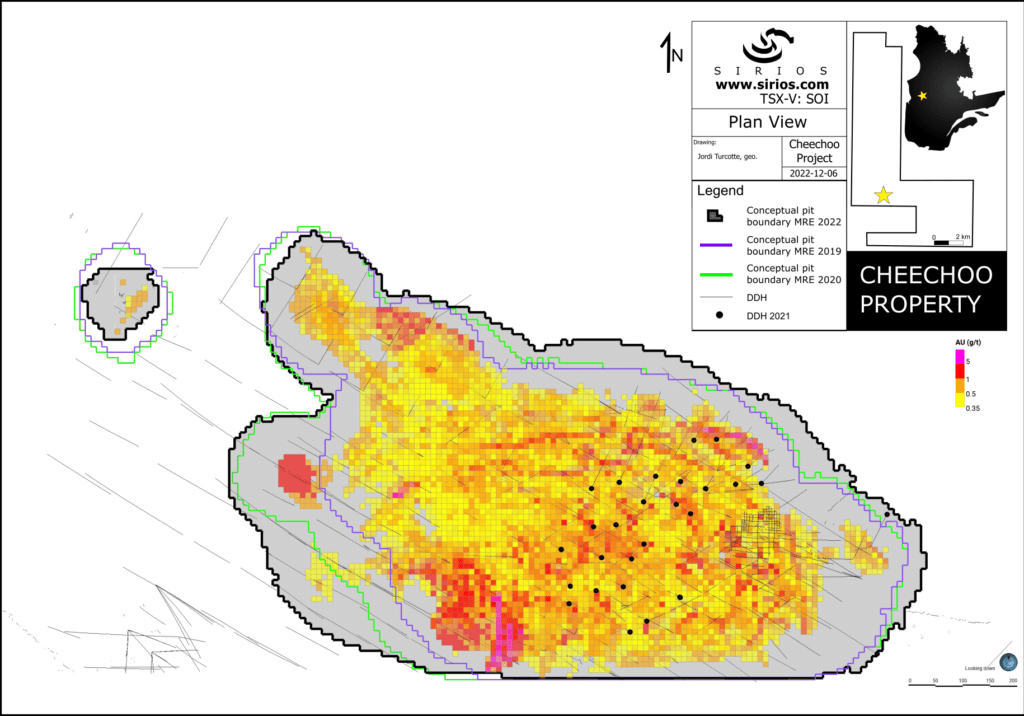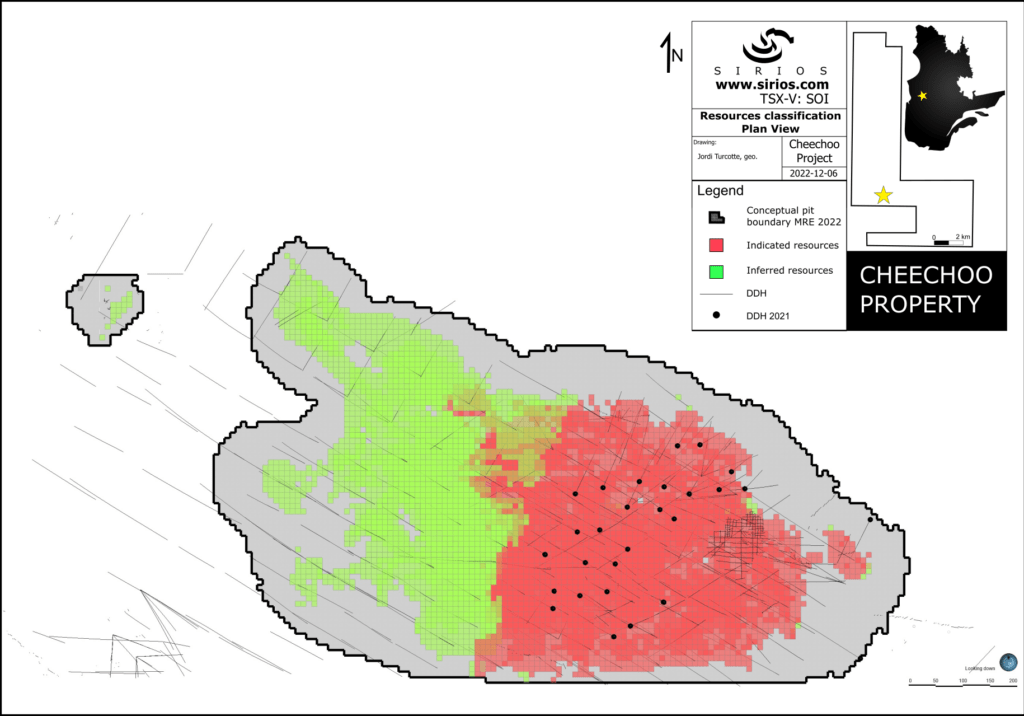MONTREAL (QUEBEC) – Management of SIRIOS RESOURCES INC. (TSX-V: SOI) is very pleased to announce the updated resource estimate for its Cheechoo gold property. The Cheechoo deposit now includes 74% of the gold ounces classified as indicated resources. In addition, the gold grade of these indicated resources shows an increase of 45% over the 2020 resources. This resource update follows the 2021 definition drilling program totalling 6,836 m on Sirios’ 100%-owned Cheechoo property located in Eeyou Istchee James Bay, Quebec.
The updated resource estimate (Table 1), based on an open pit development model, includes indicated resource of 1.4 million ounces of gold contained in 46.3 million tonnes at an average grade of 0.94 g/t Au, and an inferred resource of 0.5 million ounces of gold contained in 21.1 million tonnes at an average grade of 0.73 g/t Au.
Table 1: Conceptual pit-constrained Indicated and Inferred Resource Estimate for the Cheechoo Project
These excellent results were made possible by the 2021 definition drilling campaign, as well as the recent 1 kg re-assaying campaign. This work has allowed us to refine the geological modeling and improve the structural understanding of the high-grade zones. The improvement of the 3D model allowed for the revision of several interpolation parameters, including the variography and capping. In addition, a more advanced review of the metallurgical tests allowed the application of optimized recovery rates by grade range. Finally, the increase in the cut-off grade also contributed to the increase in the average grade of the mineral resource. Together, these elements demonstrate the excellent characteristics of the Cheechoo deposit, which has seen a significant increase in average grade while retaining a considerable number of defined ounces of gold.
The progress made by Sirios over the past two years has improved the understanding of the Cheechoo deposit and resulted in an updated resource estimate, which includes the presence of indicated resources for the first time.
Dominique Doucet, President and CEO of Sirios, stated, “We are very pleased with this updated gold resource estimate on Cheechoo. The improvement in the Cheechoo deposit is extraordinary, both in terms of the conversion of inferred resources to indicated resources, which represents over 74% of the gold ounces, and in the impressive increase in the average gold grade of the deposit, which now is greater than 0.9 g/t Au for the indicated resources. Once again, we have demonstrated that the Cheechoo project improves significantly with each new campaign undertaken on the property. Despite the recent increase in operating costs in the mining industry, the estimated gold resource on Cheechoo remains substantial, demonstrating the strength of our project. Moreover, exploration continues in the area of the conceptual pit, with the goal of increasing the resources. As shown by recent trenching results in the metasediments to the east of the deposit, the discovery potential across the property remains excellent.”
This updated resource estimate is presented with different cut-off grades as shown in Table 2. Note that the official resource is presented at a cut-off grade of 0.35 g/t Au and that the additional cut-off grades are presented for information purposes only.
Table 2: Cut-off grade sensitivity table
Figure 1 Plan view of the 2022 conceptual pit shell (contour in black).
Figure 2 Plan view of the conceptual pit shell with resources classification.
The mineral resource estimate has been prepared by consulting firm BBA Inc. in accordance with the Canadian Institute of Mining, Metallurgy and Petroleum (“CIM”) Definition Standards incorporated by reference in National Instrument 43-101 (“NI 43-101”). The estimate is based on data from 329 diamond drill holes totaling 76,713 metres and 386 channel samples totalling 3,217 metres which were completed by Sirios between 2012 and 2022. The full technical report will be available on SEDAR (www.sedar.com) under the Corporation’s issuer profile within 45 days. The effective date of the current mineral resource estimate is July 20, 2022.
Notes to the MRE Table:
- The independent qualified person for the 2022 MRE, as defined by NI 43-101 guidelines, is Pierre-Luc Richard, P. Geo., of PLR Resources Inc. The effective date of the estimate is July 20, 2022.
- These mineral resources are not mineral reserves as they do not have demonstrated economic viability. The quantity and grade of reported Inferred resources in this MRE are uncertain in nature and there has been insufficient exploration to define these resources as Indicated or Measured; however, it is reasonably expected that the majority of Inferred Mineral Resources could be upgraded to Indicated Mineral Resources with continued exploration.
- Resources are presented as undiluted and pit constrained, and are considered to have reasonable prospects for economic extraction. A cut-off grade of 0.35 g/t Au was used for the MRE. The pit optimization was done using Deswik mining software. The constraining pit shell was developed using pit slopes of 45 to 50 degrees in hard rock and 26 degrees in overburden. The cut-off grade and pit optimization were calculated using the following parameters (amongst others): Gold price = USD1,650; CAD:USD exchange rate = 1.29; Hard Rock Mining cost = $2.90/t mined with incremental bench costs of $0.05 per 10 m bench; Overburden Mining Cost = $5.00/t mined; Mining Recovery = 95%; Mining dilution = 5% at 0 g/t Au; Metallurgical Recovery varying from 84% to 92%; Processing cost = $14.57/t processed; G&A = $5.42/t processed; and Refining and Transportation cost = $5.00/oz. The conceptual pit-constrained resource has a 2.3:1 stripping ratio at the 0.35g/t Au cut-off grade. The cut-off grade will be re-evaluated in light of future prevailing market conditions and costs.
- The MRE was prepared using Surpac 2022 Refresh 1 and is based on 329 surface drillholes (76,713m) and 386 surface channel samples (3,217m), with a total of 55,566 assays. The resource database was validated before proceeding to the resource estimation. Grade model resource estimation was interpolated from drillhole and channel data using an OK interpolation method within blocks measuring 10 m x 10 m x 10 m in size. The cut-off date for drillhole database was July 20, 2022.
- The model comprises 20 mineralized zones (which have a minimum thickness of 3 m, with rare exceptions mostly between 2 and 3m), and two low-grade mineralized body mostly included in the tonalite intrusive unit, each defined by drillhole intercepts. The block model was reblocked to 10m x 10m x 10m using the weighted average grade and tonnage from high-grade and low-grade zones.
- High-grade capping was done on the composited assay data and established on a per zone basis. Capping grades vary from 3 g/t Au to 55 g/t Au. A value of zero grade was applied in cases where core was not assayed.
- Fixed density values were established on a per unit basis, corresponding to the median of the SG data of each unit ranging from 2.65 t/m3 to 2.76 t/m3. A fixed density of 2.00 t/m3 was assigned to the overburden.
- The MRE presented herein is categorized as Indicated and Inferred Resources. The Indicated Mineral Resource category is defined for blocks that are informed by a minimum of two drillholes where drill spacing is less than 50 m for the intrusive-related mineralization applied to 10x10x10m reblocks. The Inferred Mineral Resource category is defined for blocks that are informed by a minimum of two drillholes where drill spacing is less than 100 m for the intrusive-related mineralization applied to 10x10x10m reblocks. Where needed, some materials have been either upgraded or downgraded to avoid isolated blocks.
- The number of tonnes (metric) and ounces were rounded to the nearest hundred thousand.
- CIM definitions and guidelines for mineral resource estimates have been followed.
The scientific and technical content of this press release has been reviewed and approved by Mr. Dominique Doucet, P.Eng. President and CEO of Sirios Resources Inc. and Mr. Jordi Turcotte, P. Geo. Senior Geologist who are “Qualified Persons” as defined by National Instrument 43-101 – Standards of Disclosure for Mineral Projects (“NI 43-101”).
About Cheechoo Property
Sirios’ 100% owned Cheechoo property is located in the Eeyou Istchee James Bay region of Quebec, approximately 800 km north of Montreal, 200 km east of Wemindji and less than 10 km from Newmont’s Eleonore gold mine.
Annual and Special Meeting of shareholders on December 15th
The meeting will be held in person in Montreal at 10 a.m. at 1000, rue de la Gauchetière, Salon de la Gauchetière, but shareholders and others interested in attending virtually can register at the following URL address.
https://us06web.zoom.us/webinar/register/WN_8oQXqPMfRJ-qDMHkZB3EaA
The meeting will be conducted in French, followed by a presentation by the President in English. A question period will then be held in both languages.
About Sirios
Pioneer in the discovery of significant gold deposits in the Eeyou Istchee James Bay region of Quebec, Canada. Sirios focuses its work mainly on its Cheechoo gold discovery, while actively exploring the high auriferous potential of its other properties.
Cautionary note regardinf forward-looking information
This news release contains “forward-looking information” within the meaning of applicable Canadian securities legislation based on expectations, estimates and projections as at the date of this news release. Forward-looking information involves risks, uncertainties and other factors that could cause actual events, results, performance, prospects and opportunities to differ materially from those expressed or implied by such forward-looking information. Factors that could cause actual results to differ materially from such forward-looking information include, but are not limited to, capital and operating costs varying significantly from estimates; the preliminary nature of metallurgical test results; delays in obtaining or failures to obtain required governmental, environmental or other project approvals; uncertainties relating to the availability and costs of financing needed in the future; changes in equity markets; inflation; fluctuations in commodity prices; delays in the development of projects; the other risks involved in the mineral exploration and development industry; and those risks set out in the Company’s public documents filed on SEDAR at www.sedar.com. Although the Company believes that the assumptions and factors used in preparing the forward looking information in this news release are reasonable, undue reliance should not be placed on such information, which only applies as of the date of this news release, and no assurance can be given that such events will occur in the disclosed time frames or at all. The Company disclaims any intention or obligation to update or revise any forward- looking information, whether as a result of new information, future events or otherwise, other than as required by law.
The estimate of Inferred Mineral Resources mentioned in this press release conform to National Instrument 43-101 standards and was prepared by Pierre-Luc Richard, P. Geo., independent qualified person, as defined by NI 43-101 guidelines. The effective date of the estimate is October 31, 2020. The above-mentioned mineral resources are not mineral reserves as they do not have demonstrated economic viability. The quantity and grade of the reported Inferred Mineral Resources are conceptual in nature and are estimated based on limited geological evidence and sampling. Geological evidence is sufficient to imply but not verify geological and grade or quality continuity.




